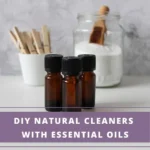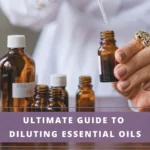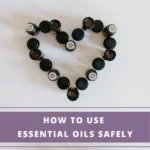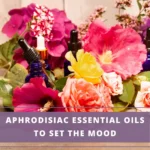As an Amazon Associate I earn from qualifying purchases. See Full Disclosure Here
Cinnamon essential oil is extracted from the bark of the Cinnamomum tree, a tropical evergreen that can grow up to 45 feet high.
This extract is rich in beneficial compounds, including cinnamaldehyde and eugenol, which contribute to its distinctive aroma and powerful properties.
The warm and spicy scent of cinnamon essential oil can instantly uplift your mood and create a cozy and inviting atmosphere in your home. Its versatile nature makes it a popular choice for both culinary and therapeutic purposes.
From promoting digestive health to boosting mood and supporting a healthy immune system, cinnamon essential oil offers a long list of powerful benefits.
 The History and Origins of Cinnamon
The History and Origins of Cinnamon
Cinnamon has a long and storied history that dates back thousands of years. The first recorded use of cinnamon was in ancient Egypt, where it was used in embalming rituals and as an offering in temples.
This prized spice played a significant role in the spice trade, with its demand surpassing even that of gold. Cinnamon was highly valued for its aromatic and medicinal properties, and its popularity spread across various cultures and civilizations.
Today, cinnamon is cultivated primarily in India, Sri Lanka, and other tropical regions.
Cinnamon Essential Oil Properties & Benefits
Several studies have been done to learn more about the properties of cinnamon essential oil and the results have been surprising. These are the most widely studies properties and benefits of cinnamon essential oil.
Antimicrobial: The extract has powerful antimicrobial properties, making it useful for treating a variety of infections, including skin infections, respiratory infections, and digestive infections.
Anti-inflammatory: Cinnamon essential oil also has anti-inflammatory properties and is very effective in reducing pain and inflammation associated with conditions such as arthritis, muscle aches, and headaches.
Antioxidant: A rich source of antioxidants, cinnamon oil can help to protect the body from damage caused by free radicals. Free radicals are unstable molecules that can contribute to cell damage and chronic diseases.
Immune-boosting: Cinnamon essential oil can help to boost the immune system and improve the body’s ability to fight off infection.
Top Uses for Cinnamon Essential Oil
Cinnamon essential oil offers a wide range of uses and benefits for your well-being. Here are some of the top ways you can incorporate cinnamon oil into your daily routine:
Soothe Digestive Discomfort
Cinnamon oil can be diluted with a carrier oil and applied to the stomach to soothe digestive spasms, indigestion, and nausea. Its calming properties make it a great natural remedy for digestive issues.
The belly area is the best pulse point to apply cinnamon essential oil to soothe digestion.
Although cinnamon essential oil features on this FDA list of essential oils approved for ingestion, I prefer to err on the side of caution and advise against taking any essential oil internally.
Boost Mood and Energy
The warm and invigorating scent of cinnamon essential oil creates a positive and energizing environment. Inhaling this aroma can help uplift your mood and increase energy levels.
Enhance Brain Activity and Focus
The scent of cinnamon has been shown to improve brain activity and concentration. Diffusing a blend of cinnamon, rosemary, and lemon essential oils can help enhance focus and cognitive function.
Manifest Money & Abundance
Cinnamon is one of the best essential oils for manifesting money and abundance. Inhaling the warm, spicy scent of cinnamon essential oil increases vibrations and helps manifest goals related to abundance and success.
The warm, spicy aroma of cinnamon essential oil helps foster confidence and motivation. It also inspires creativity and attracts opportunities.
Promote Healthy Immune Function
This extract has antimicrobial properties that may help prevent illness and support a healthy immune system. Diffusing cinnamon oil during cold and flu season can help purify the air and create a protective environment.
How to use essential oils for immune system support.
Aromatic Applications of Cinnamon Essential Oil
The aromatic properties of cinnamon essential oil make it a great choice for creating a warm and inviting atmosphere in your home. Whether you want to uplift your mood or create a cozy ambiance, diffusing cinnamon essential oil can work wonders.
Simply add a few drops of the oil to your diffuser and let the spicy aroma fill the air. You can also blend cinnamon essential oil with other oils like clove, ginger, or orange to create custom diffuser blends that suit your preferences.
The warm and cozy aroma of cinnamon is reminiscent of Holiday cookies and baking, making it hugely popular during this festive season. It features high on the list of top 12 Christmas essential oils and is used in many Christmas diffuser blend recipes.
Cinnamon is also one of the essential oils used to create this Peppermint Candy Cane diffuser blend as well as a variety of Gingerbread diffuser blends.
Topical Uses and Benefits of Cinnamon Essential Oil
When used topically, cinnamon essential oil can provide a range of benefits for your skin and overall well-being. However, it’s important to note that cinnamon essential oil is potent and should be diluted with a carrier oil before applying it to your skin.
This will help prevent any potential skin irritation or sensitivity. Once properly diluted, you can use cinnamon essential oil in various ways:
1. Massage oil: Create a soothing massage oil by diluting cinnamon essential oil with a carrier oil like coconut or jojoba oil. This can help relax tight muscles, ease painful joints, and relieve menstrual cramps.
2. Foot soak: Add a few drops of diluted cinnamon essential oil to a warm foot bath to soothe tired feet and promote relaxation. This can be especially beneficial if you have cold feet at night. Surprisingly easy ways to soothe tired, achy feet.
3. Skincare: Cinnamon essential oil has antimicrobial and antioxidant properties, making it a valuable addition to your skincare routine. Add a drop of cinnamon essential oil to your moisturizer or create a DIY face mask with other natural ingredients for a rejuvenating skincare treatment.
4. Hair care: Cinnamon essential oil can be used to promote scalp health and stimulate hair growth. Add a few drops to your shampoo or create a hair mask by combining cinnamon oil with a carrier oil like olive or coconut oil.
DIY Recipes with Cinnamon Essential Oil
Cinnamon essential oil can be a versatile ingredient in your DIY projects, from natural cleaning solutions to personal care products. Here are a few simple and effective recipes to try:
All-purpose cleaner: Create a natural and effective all-purpose cleaner by combining water, vinegar, and a few drops of cinnamon essential oil in a spray bottle. Use this mixture to clean surfaces throughout your home, enjoying the pleasant scent and antimicrobial properties of cinnamon.
Spiced room spray: Fill a spray bottle with water and add a few drops of cinnamon essential oil along with other complementary oils like orange or clove. Use this spiced room spray to freshen up your living space and create a cozy atmosphere. How to make room sprays with essential oils.
Cinnamon lip balm: Make your own nourishing lip balm by melting beeswax, coconut oil, and shea butter together. Once melted, add a few drops of cinnamon essential oil for a delightful flavor and scent. Pour the mixture into small containers and let it solidify.
Cinnamon Essential Oil Diffuser Blend Recipes
Creating custom diffuser blends with cinnamon oil can enhance the ambiance of any space. Here are some delightful diffuser recipes to try:
Cozy Winter Retreat
• 3 drops cinnamon oil
• 2 drops orange oil
• 2 drops cedarwood oil
This blend evokes the cozy atmosphere of a winter retreat, with the warm and inviting scent of cinnamon, the uplifting aroma of orange, and the grounding notes of cedarwood.
Energizing Morning Boost
• 2 drops cinnamon oil
• 2 drops peppermint oil
• 2 drops lemon oil
Start your day with an energizing boost by diffusing this invigorating blend. The combination of cinnamon, peppermint, and lemon oils will help awaken your senses and promote a focused mindset.
Relaxing Evening Serenity
• 3 drops lavender oil
• 2 drops cinnamon oil
• 2 drops frankincense oil
Create a serene and calming atmosphere in the evening with this soothing blend. The gentle scent of lavender, combined with the warmth of cinnamon and the grounding aroma of frankincense, will help you unwind and prepare for a restful night’s sleep.
Cinnamon Fusion diffuser blend recipe
Precautions When Using Cinnamon Essential Oil
As with any essential oil, it is important to use cinnamon oil safely and responsibly. Here are some tips to keep in mind when using cinnamon essential oil:
• Always dilute cinnamon oil with a carrier oil before applying it to the skin. Cinnamon oil is considered a “hot” oil and can cause skin irritation if used undiluted. Learn the basics of diluting essential oils the right way.
• Perform a patch test before using cinnamon oil topically. Apply a small amount of diluted cinnamon oil to a small area of skin and observe for any adverse reactions.
• Cinnamon oil should not be ingested without the guidance of a certified aromatherapist or healthcare professional. It is important to remember that essential oils are highly concentrated and should be used with caution.
• When diffusing cinnamon oil, start with 1-2 drops and adjust the amount based on personal preference. Remember to always follow the manufacturer’s instructions for your diffuser.
• Keep cinnamon oil out of reach of children and pets. It is not generally suitable for use in children under 6 years old.
Cinnamon essential oil is a versatile and aromatic oil that can enhance various aspects of your life. From creating a warm and inviting atmosphere in your home to supporting your overall well-being, cinnamon essential oil offers a wide range of benefits.
Whether you choose to diffuse it, use it topically, or incorporate it into your favorite recipes, cinnamon essential oil can be a valuable addition to your natural wellness toolkit. Remember to use it responsibly, follow proper dilution guidelines, and enjoy the many wonders of this beloved spice.
 Disclaimer: This information is not intended to serve as medical advice. Please consult your doctor before using any natural medication or if you experience any unusual symptoms. See Full Disclaimer here.
Disclaimer: This information is not intended to serve as medical advice. Please consult your doctor before using any natural medication or if you experience any unusual symptoms. See Full Disclaimer here.










